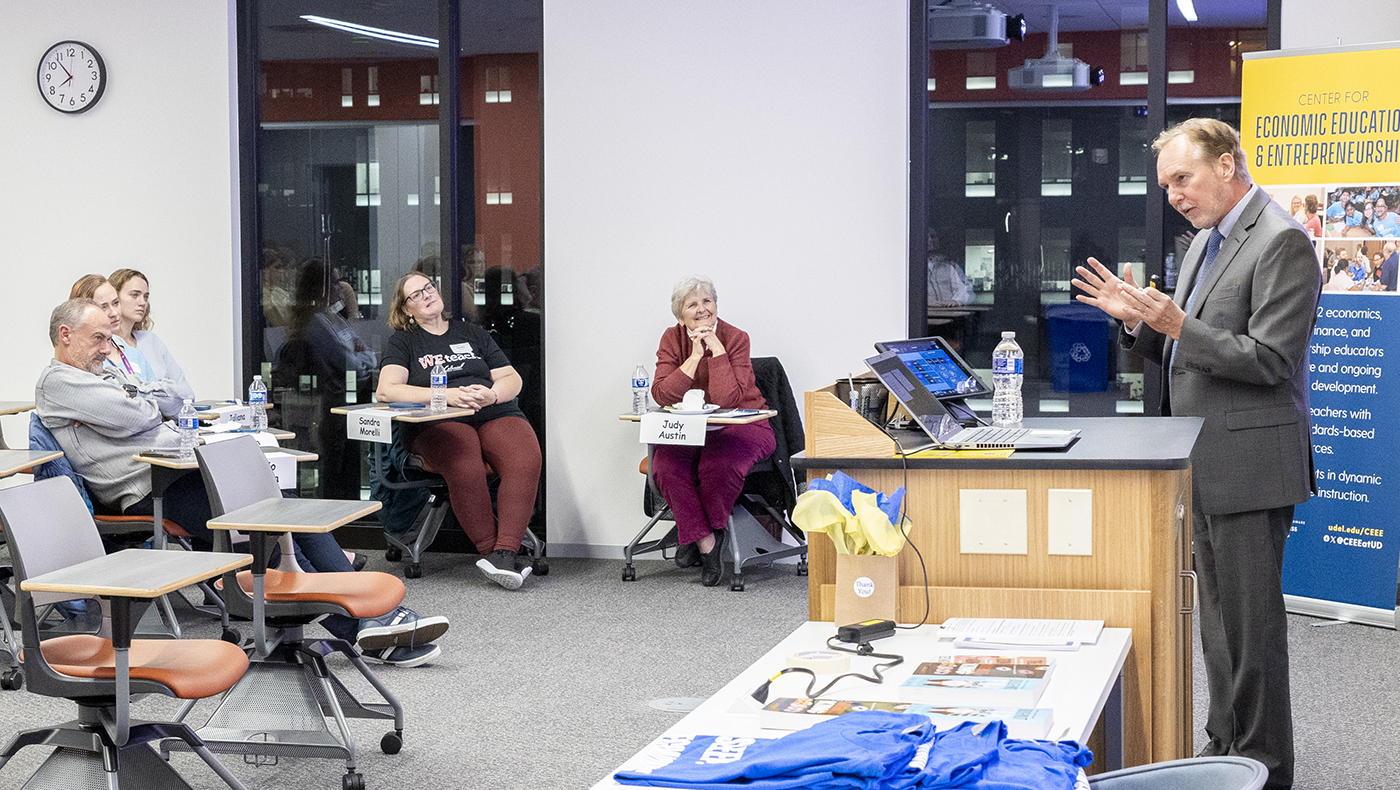When Ted Ngoy and his family immigrated to California in the 1970s, they had just escaped a violent war in Cambodia. Of the many things he found in the United States, Ngoy became fascinated by the American staple, the donut. In a few short years and a lot of hard work, his fascination became a reality as he grew his first donut shop into a successful chain and became “The Donut King.”
Ngoy’s story was the focus of a 2020 documentary movie “The Donut King,” which served as this fall’s featured Econ Dinner and a Movie professional learning session for local K-12 teachers on Nov. 14 hosted by the University of Delaware’s Center for Economic Education and Entrepreneurship (CEEE) at the Alfred Lerner College of Business and Economics. The session was designed to give teachers more resources and insight on how historical storytelling can help them better teach financial, entrepreneurial and economic concepts to their students.
The film focused on various themes including entrepreneurial concepts and skills, and building a sense of community and confidence. These are the main takeaways the CEEE hopes teachers can share with students.
“The movie does a great job of demonstrating what makes entrepreneurs successful,” said Sarah Johnson, instructional designer with the CEEE. “It illustrates the importance of innovation, risk-taking, managing costs of production, and monitoring competition.”
Added CEEE Instructional Designer Amy Krzyzanowski, “The Center strives to provide culturally responsive resources for Delaware educators and the Econ Dinner and a Movie program is one way we can accomplish this. Through the lens of ‘The Donut King,’ students are exposed to other cultures and life experiences which, in turn, allows them to see the world beyond their own little bubble.”
Krzyzanowski stated that through this film, students learn about a new culture while seeing an excellent real-world example of the entrepreneurial process.
“The beauty of this film is that it provides lessons that cross into other content areas as well; for example, history teachers can highlight the push and pull factors that led to Ted Ngoy immigrating to the United States,” continued Krzyzanowski. “By doing so, our students will see that the entrepreneurial spirit isn’t limited to one type of person, and hopefully, they’ll be able to see themselves as future problem solvers and entrepreneurs.”
Ngoy also sponsored hundreds of Cambodian refugees and offered them employment in his donut shops. However, his fortune succumbed to his gambling habits. This created tension within his family that ultimately led to division, and he quickly amassed a large debt that he could no longer pay off, even with his million dollar fortune.
CEEE invited guest speaker Chris Johnson, a global talent management specialist and the managing director at P4 Advisors, to speak about his own journey as an immigrant and entrepreneur and why this particular movie could be so beneficial in learning about entrepreneurship. Chris Johnson is also the father of Sarah Johnson.
“It…shows how people become really motivated when they have a need,” said Chris Johnson. “One of the keys to success is helping each other, and Ted did that very much for his community.”
Ngoy’s story also represents a kind of warning by showing how Ngoy lost everything he built up through irresponsible decisions and overconfidence, which Chris Johnson also commented on as an important aspect of the movie.
“It also shows that some of the skills and capabilities that make entrepreneurs successful can also lead to their downfall,” said Johnson.
Chris Johnson explained how he has lived on three different continents himself, and how this interaction with different cultures has greatly helped him in his own work and communication with other people.
One of the teachers in attendance at the event was Shae Fisher, a 7th and 8th grade American and U.S. History teacher at Peirce Middle School in West Chester, Pennsylvania. Before the movie began, Fisher discussed her own expectations and what she hoped to gain from the event as a classroom teacher.
“I hope to learn about a diverse story of how they were able to use their skills and create a better life for themselves,” said Fisher.
In the course she teaches, Fisher noted how they talk a lot about immigration and people starting their own businesses shortly after traveling to the United States. By watching “The Donut King,” Fisher can more efficiently take these themes and apply them directly to her classroom, aiding students in better understanding these concepts of entrepreneurship.
“When teachers attend CEEE events like Dinner and a Movie they become a part of building a more vibrant and cohesive community of economics educators in Delaware,” said Sarah Johnson.
Sarah Johnson also described how these types of events allow teachers to examine different economics concepts in real-life applications that cannot always be replicated through school curriculum materials. This in turn can lead to more engaging activities for students back in the classroom.
Jay Davis, career and technology specialist at Smyrna High School, spreads the word and shares materials, lessons and resources with Smyrna High School’s business and financial literacy teachers. Financial literacy had always held a special place in his life; from growing up on a family farm, through hands-on learning and earning, but sharing life experiences with students over the past 28 years of my educational career.
“Everyone speaks MONEY and regardless of your background, knowing how to be financially savvy is important,” Davis said. “The Donut King professional learning experience not only provided a global history lesson, but also showed that hard work does indeed pay off. It also echoed the side effects of having too much money and that money can be the root of all evil; essentially your rags to riches and back to rags story.”




